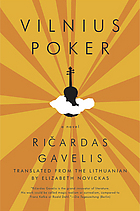
Although I was engaged and rewarded almost constantly by Ričardas Gavelis's Vilnius Poker (translated by Elizabeth Novickas), I know the book is not for everyone. In particular Vytautas Vargalys, its delusional, pathologically misogynist labor-camp survivor protagonist whose PTSD-spurred paranoia presents him with a nameless group of nameless but italicized Them lurking around every corner, makes a challenging companion throughout the first 300 pages of the book. There is, undeniably, darkness and the grotesque around every corner, in a way genuinely challenging to witness; furthermore, if a reader doesn't connect with Vargalys's voice, those 300 pages will be a hard slog. And yet, the section narrated by Vargalys is the book's backbone, its primary strength; and while the following three narrators all add dimensions to Vargalys's demented, self-centered account of the events leading up to a murder in an overgrown Vilnius garden one autumn twilight, the soul of Vilnius Poker lies with Vargalys.
So too, the very things that make these first 300 pages trying are the things that make them unique, even exhilarating. Vargalys's section, for example, takes the idea of a "circular narration" to new heights: not only does it end in the same place and time it began, ranging far and wide in between (a fairly common narrative technique), but the interim takes the form less of a line and more of a kind of fugue, with a whole host of recurring themes that weave around each other, coming together in different combinations as Vargalys's mind roves over past, present and future. Birds, fog, dead leaves, human shit, disfigured genitalia, stray dogs, eyes and clandestine observation, cockroaches, the river and Them: all weave in and out of each other in Vargalys's mind, forming bridges from one experience to another and one theme to the next. At times one of these notes will sound alone, isolated from the rest; at other times, three or four of them will build on top of each other, marking a particular crescendo in the narrative: fog and stray dogs will come together in a scene of clandestine observation; or rotten leaves and cockroaches will announce Their presence; the birds will be mysteriously absent when the cockroaches conspicuously appear; or a series disfigured sexual organs will become conflated with sinister watching eyes. It is these combinations and recombinations that drive Vargalys's narrative, rather than a separation between "now" and "then" or "dream" and "reality."
I walk slowly through a dream called Vilnius, while the weird sensation that all of this has already been pierces my brain. Once I went down the street in exactly the same way, in exactly the same way I considered what the dream—the yellowish leaves, blown about by the wind, and the old house in the depths of a garden—could mean...The exact same pair of dazed pigeons have already perched by the announcement post. Lolita has already waited for me in the corridor, rocking her waist back and forth in exactly the same way...Everything has already been, everything, everything, has already been. I know it's just déja vu, but all the same a sense of fear stabs right through me. In exactly the same way Stefa's hips sway before my eyes, the hips of all the women in the world, Virgilishly leading me ever closer to the secret...The exact same shabby dog with a huge head and still larger sexual organs and a long body like a rat's sniffs the ground outside the window...The coffee break table seems just as unreal as it has seemed many times before.
As demonstrated in this passage, the free association of themes as an organizing principle means that Vargalys's narrative can flow easily from one time and/or place to another: in this instance, he begins the paragraph walking through the streets of Vilnius, and ends up sitting down to a coffee break with his co-workers. As a reader, I found this a very atmospheric and well-executed experience, and sometimes even darkly funny; as a human whose consciousness actually works this way, however, Vargalys is locked in a kind of nightmare, with little to grab hold of as his life careens by, out of his control.
This feeling of disjointed perception, in which the past is clearer than the present, other people are hazy phantoms, and time and space act unpredictably, goes a long way to fuel Vargalys's compulsion to amass "facts" about Them. It also explains Gavelis's decision to include other perspectives on the story. Vargalys is working so hard to just hold himself together that he barely notices the people around him, and when he does, they appear as sinisterly distorted caricatures. I particularly appreciated the deepening of Stefa's character: appearing in Vargalys's narrative as an annoying sexpot always underfoot, she is presented by the second narrator (their co-worker Martynas) as a devoted helpmeet who takes care of Vargalys's everyday wants and needs. The third narrator is Stefa herself, who discloses still more and greater connections with Vargalys's past, as well as becoming a fleshed-out human in her own right, with her own sets of fears, compulsions, and identity crises. (Although, I was slightly disappointed in Gavelis's decision to render the only female narration in a Molly Bloom-like stream-of-consciousness style; this struck me as crossing the line from "Joycean" to "derivative." Whence this idea that women are innately opposed to punctuation?)
And yet, the multiple narrators confuse each other's accounts as much as they enrich or clarify them. In multiple places, they directly contradict one another in ways that can't be explained by Vargalys's insanity or someone else's mistaken impression. Is Vargalys's ex-wife, for example, a lonely alcoholic caring for her dying mother, as Martynas claims, or remarried to a flashy nouveau-riche businessman, as Stefa says? Which woman was actually present the night that Vargalys and his friend Gediminas brought home the Circe of Old Town? And then there are the multiple, conflicting eyewitness reports from the scene of the crime in the garden: how many people actually were spying on Vargalys and Lolita that night, and what did they really see? These questions are never answered, and the novel seems to imply that in Vilnius, such conflicting reports can somehow coexist, despite being, to all "outside" logic, mutually exclusive. Similarly, the narrator Martynas writes of a seeming contradiction that is actually perfectly consistent:
Once I nearly choked with laughter listening to a Harvard professor on the radio defending this Muscovite psychiatrist. The world accused this psychiatrist of stuffing dissidents into secret nuthouses. That's not true, it can't be, the Harvard professor railed, that Muscovite is a true scholar; he's published serious work. I even fell out of my chair laughing. No Harvard professor would be able to understand that a perfectly serious scholar could, of his own free will, be a complete butcher. No American or Frenchman would understand that the manager of a gas chamber in Hitler's Germany could have played the piano like a virtuoso and worshipped Chopin. No, they won't understand it. Those American and French brains aren't constructed right.
Vilnius Poker consistently asks us to reexamine what constitutes a contradiction. We can probably all conceptualize conflicting value judgments or relative perceptions—one person thinks of an object as "large" whereas someone else finds it "small," for example—without too much mental strain, but there comes a point when differing reports are impossible to reconcile. Or does there? If two people witness the same incident and see a different woman in the lead role, can both, in some way, be correct? If two people witness a murder and see with their own eyes a different perpetrator, is one of them necessarily wrong?
One last note: throughout the novel I struggled with Vargalys's violently distorted view of women and sexuality, and judging from some of the reviews on LibraryThing, I'm not alone. He perceives sexual partners (of both genders, actually, but the majority are women) to be basically predatory; in his mind they are reduced to disembodied parts (eyes, mouths, vaginas) attempting to suck out his humanity. This is genuinely very disturbing to read. However, I do feel that within the greater context of the novel, it is treated as part of Vargalys's pathology, not as Gavelis's own worldview; and furthermore, it's presented as a byproduct of the sexual torture Vargalys himself endured in the Gulag's labor camps. Imprisoned away from women from age 17 to 28, he matures in this cruel and distorted environment. He is released with an intact desire to achieve closeness with other people, but with a severely warped perception of how to go about it and how to read others' signals. It's a sobering reminder that human rights abuses leave a long legacy of trauma on the societies they affect, and that when people are victimized long enough they tend inevitably to victimize others (and themselves) in their turn. A difficult yet haunting read.
Vilnius Poker was the November pick for The Wolves; please join us for Gabriel Garcia Marquez's shorter and potentially less bizarre nonfiction volume Clandestine in Chile on or around December 31!







